
From Josh Rogin, the Cable: Russian President Dmitry Medvedev‘s decision not to sell advanced weaponry to Iran is being hailed as a dividend of the Obama administration’s "reset" policy with Russia. And although the administration didn’t expressly offer the Kremlin a quid pro quo for the reversal, Moscow will expect moves by Washington in return as it cautiously moves to grasp Obama’s outstretched hand. …
Russia’s decision, which is seen by Kremlinologists as being driven by Medvedev himself, is being touted by the White House as a new dawn in the U.S.-Russia relationship and a significant move in further isolating the embattled regime in Tehran. A senior administration official, speaking to The Cable on background basis, said Moscow’s refusal to sell the S-300 air defense system and various other advanced weaponries was a significant decision, because imposing sanctions on Iran is more costly for Russia than for the United States.
"They’ve made that very clear to us for the last two years that this is not a symmetrical transaction for them and they don’t share the same threat assessment as us vis-a-vis Iran," the official said. "The decision was a bold one that acknowledges how important it is to us and how important Medvedev takes this reset with President Obama."
The officials explained that the Obama administration made clear to Medvedev and other Russian officials that the sale of the S-300 to Iran was a red line that couldn’t be crossed, and one that was raised in every high-level meeting between the two countries. Israeli officials did the same in meetings with their Russian counterparts. …
As for why the Russians finally decided to scuttle the arms deal after years of lobbying by Washington, the official speculated that Moscow now has something it needs — and that it finally has faith that the U.S. is willing to help. Russia is jockeying for as much U.S. support as possible for their upcoming bid to join the World Trade Organization (WTO), and Moscow is planning to finalize its bid this year.
"Momentum on WTO accession is what they see as they next big negotiations with us. We’re right in the middle of that. That’s asymmetric because that’s more in their interest than ours. I think we have to deliver on that," the official said.
But the Obama administration isn’t asking Russia for favors or giving them out in return, the official explained. The idea is to make the U.S.-Russia relationship more valuable to the Russians than their relationship with Iran, and both countries should act in their own interests.
"The objective is not actually to develop a good relationship with Russia. The goal here is to advance our national security and economic interests and to promote universal values," the official said. …
"This announcement seemed to be very much owned by Medvedev. On the face of it, the U.S. policy of engaging Medvedev and ignoring Putin seems to have strengthened his hand in this case," said Alexandros Petersen, senior fellow at the Atlantic Council.
But although there is not direct linkage in the Obama administration’s eyes, the Russians will definitely want to get something for their efforts. A clause in the S-300 announcement specifies that Russia could rescind its ban at any time. This means that if the White House wants to keep the reset progressing, they are going to have to keep giving Moscow concessions, such as a civilian nuclear deal the Russians want but that faces opposition in Congress.
"I think this is something they are going to try, and if they don’t see something significant in return, you’ll start to see a roll back of this promise," Petersen said. (photo: AP)
Image: ap%209%2024%2010%20%20Dmitry%20Medvedev.jpg
